 ElectricalConnection.org
ElectricalConnection.org
Connect with Us:
Facebook
LinkedIn
Twitter
YouTube
The Electrical Safety Foundation International estimates that there are 53,000 residential electrical fires annually in the United States. These fires result in 500 deaths, 1,400 injuries and more than $1.4 billion in property damages each year. What caused these massive tragedies? Home electrical hazards caused by faulty wiring and systems.
Another study done by the Fire Protection Research Foundation showed that the majority of homes at risk are very old and not up to code. However, faulty electrical wiring and systems are a hazard for new and old homes, which is why we created a visual check list to assess your home’s electrical system.
WARNING: While homeowners can visually inspect electrical systems, we do not recommend they attempt to fix or tinker with them in any way. Leave that to an IBEW/NECA professional.
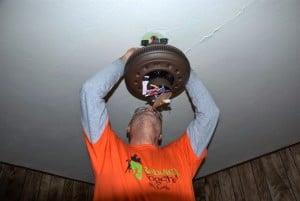
Any electrical outlets in your home that are near a water source–sinks, bathtubs, washing machines–require a ground fault circuit interrupter (GFCI) according to the National Electrical Code. A GFCI is a fast-acting circuit breaker that shuts down your electricity as quickly as 1/40 of second after a fault occurs. If you’re missing a GFCI an electrical professional can easily install one for you.
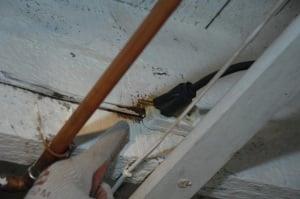
When you are using an extension cord, always ensure that the plug has all three prongs. This ensures that your cord will stay properly grounded, which will prevent the cord from overloading. Any extension cords without the third prong should be discarded immediately.
Never use an extension cord for an extended time as a permanent or temporary wiring solution. Extension cords aren’t made to be used for long periods of time and can result in electrical fires. Additionally, you should never use an extension cord for an electrical heating appliance. The cord provided with the heating device is properly rated and should be connected directly to the electrical outlet.
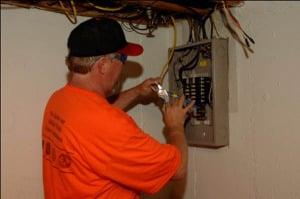
Visually inspect your home’s service panel and note any potential concerns. An IBEW/NECA professional should be contacted if the panel is not firmly attached to the wall or wires are not neatly enclosed within their protective box. If there is any corrosion or deterioration noted, contact an IBEW/NECA professional for repairs.
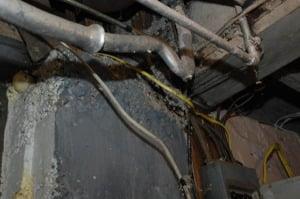
Any stray or faulty wire can be cause for concern. That’s why it’s so important to do regular checks on the wire runs in your home. Visually examine each set of wires to make sure they are in a protective conduit and that there are no exposed wires, especially near water pipes. In the image above, the wires should be in a conduits. Also, examine (don't touch) connection points between wires. Each connection point should be capped with a wire connector and all connection points should be enclosed within an appropriate UL approved junction box. Any wire runs that don’t meet these specifications should be addressed by a licensed electrical professional.
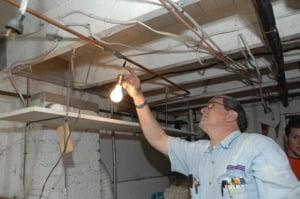
Have a licensed electrician or electrical contractor come in and take a look at your light fixture mounts and compare them to the National Electrical Codes (NEC) standards. Electrical Connection members frequently encounter homes where lights are simply dangling and not properly housed in a fixture anchored securely to the home. The NEC guidelines are designed to make sure that your light fixtures meet all safety standards and should be taken very seriously.
If your search uncovers anything potentially dangerous, don’t tinker or let any unlicensed “handymen” work on it; leave it to the professionals. It’s the only way to ensure your safety and that your home is up-to-code and prepared for any future inspections. At Electrical Connection we affiliate ourselves with the best electricians and electrical contractors in the greater St. Louis area. We are a partnership of the International Brotherhood of Electrical Workers Local One (IBEW) and the St. Louis Chapter of the National Electrical Contractors Association (NECA). These partnerships ensure that we can find you the best contractor for your electrical needs. Try out our Find a Contractor Directory Search and get your next electrical job started today.
When it comes to electrical hazards in your home, don’t leave anything to chance. Download a PDF of this article’s info to remember to stay safe. You can also download a number of other helpful electrical resources and guides.
Did you find this list helpful? Sign up for our newsletter for even more useful information, as well as all the latest industry news.
Recent News